NIT2201: Essay on Online Privacy - Issues, Laws and Measures
VerifiedAdded on 2022/08/24
|7
|1570
|16
Essay
AI Summary
This essay delves into the multifaceted realm of online privacy, examining its core concepts and the growing concerns surrounding data sharing in the digital age. It highlights the importance of user awareness regarding privacy risks, especially when granting data access to third-party applications or sharing information on social media platforms. The essay provides a comprehensive overview of the legal frameworks governing online privacy, contrasting the approaches of the European Union (EU) and Australia. It discusses key differences in legislation, such as the EU's broad legal rights to privacy and the Australian Privacy Act 1988, which primarily regulates data handling by government agencies. The essay includes case studies of Uber and Facebook to illustrate real-world privacy breaches and their consequences, emphasizing the need for individuals to understand privacy policies and take proactive measures to protect their personal information online. The analysis includes references to relevant academic sources to support the arguments and findings.
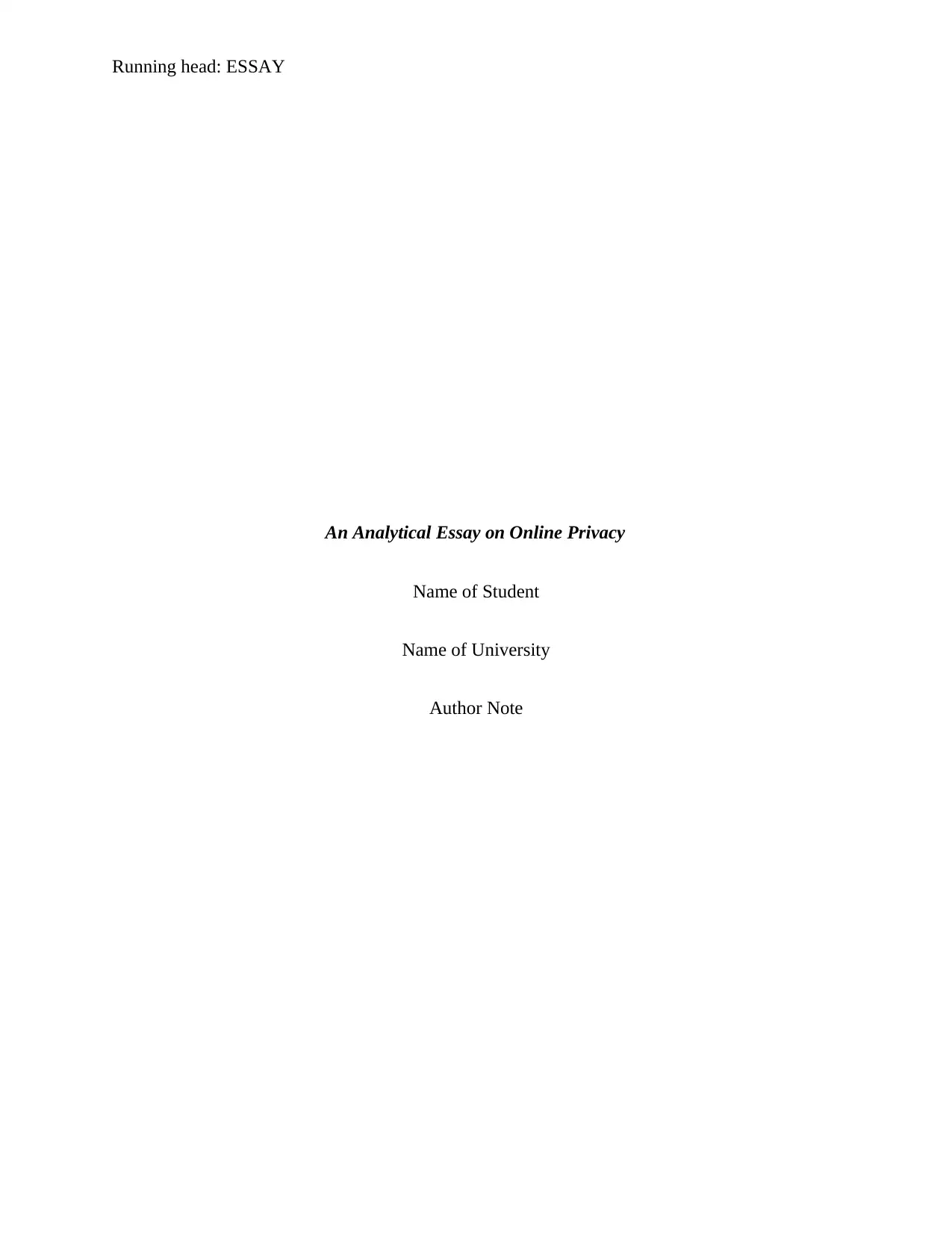
Running head: ESSAY
An Analytical Essay on Online Privacy
Name of Student
Name of University
Author Note
An Analytical Essay on Online Privacy
Name of Student
Name of University
Author Note
Paraphrase This Document
Need a fresh take? Get an instant paraphrase of this document with our AI Paraphraser
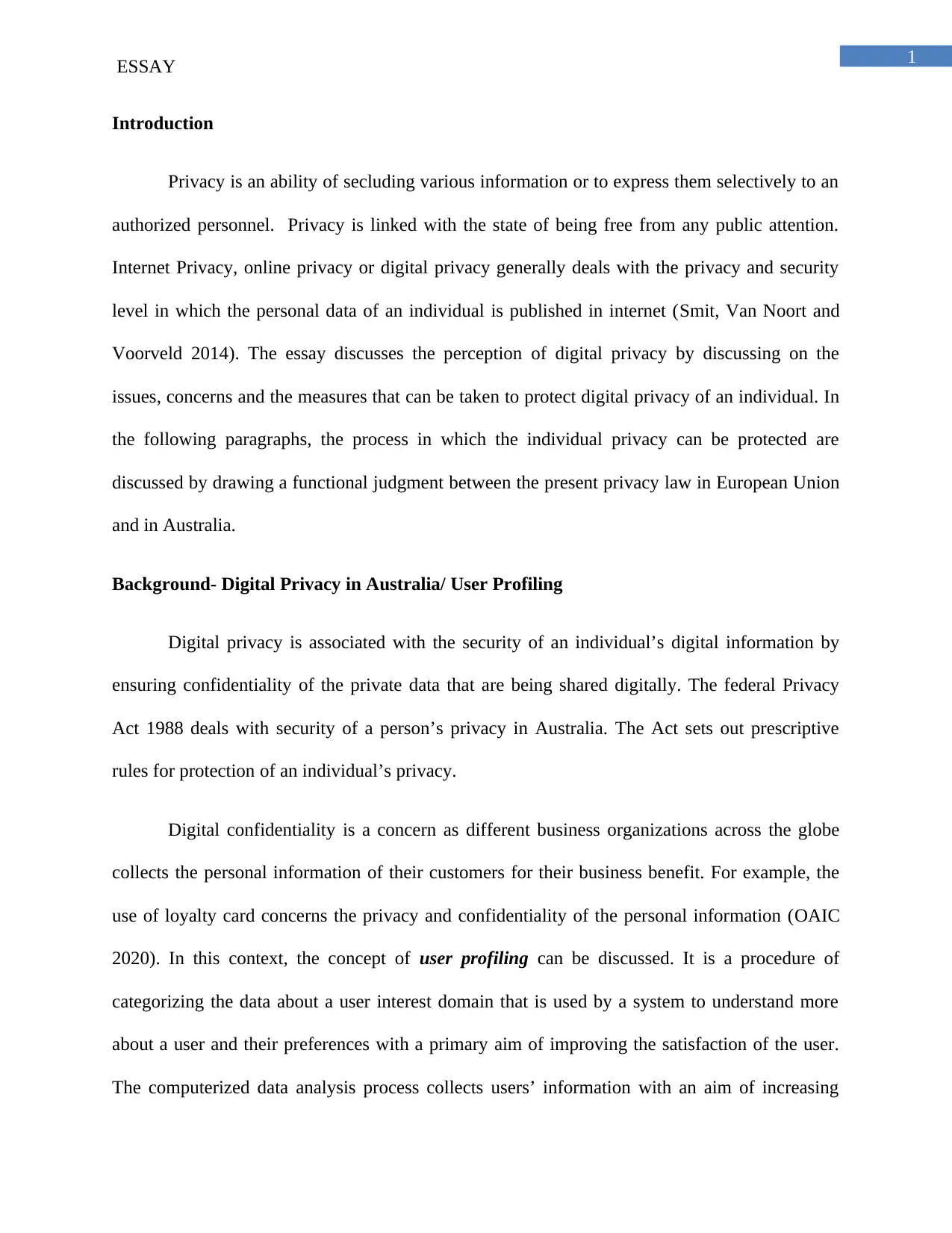
1
ESSAY
Introduction
Privacy is an ability of secluding various information or to express them selectively to an
authorized personnel. Privacy is linked with the state of being free from any public attention.
Internet Privacy, online privacy or digital privacy generally deals with the privacy and security
level in which the personal data of an individual is published in internet (Smit, Van Noort and
Voorveld 2014). The essay discusses the perception of digital privacy by discussing on the
issues, concerns and the measures that can be taken to protect digital privacy of an individual. In
the following paragraphs, the process in which the individual privacy can be protected are
discussed by drawing a functional judgment between the present privacy law in European Union
and in Australia.
Background- Digital Privacy in Australia/ User Profiling
Digital privacy is associated with the security of an individual’s digital information by
ensuring confidentiality of the private data that are being shared digitally. The federal Privacy
Act 1988 deals with security of a person’s privacy in Australia. The Act sets out prescriptive
rules for protection of an individual’s privacy.
Digital confidentiality is a concern as different business organizations across the globe
collects the personal information of their customers for their business benefit. For example, the
use of loyalty card concerns the privacy and confidentiality of the personal information (OAIC
2020). In this context, the concept of user profiling can be discussed. It is a procedure of
categorizing the data about a user interest domain that is used by a system to understand more
about a user and their preferences with a primary aim of improving the satisfaction of the user.
The computerized data analysis process collects users’ information with an aim of increasing
ESSAY
Introduction
Privacy is an ability of secluding various information or to express them selectively to an
authorized personnel. Privacy is linked with the state of being free from any public attention.
Internet Privacy, online privacy or digital privacy generally deals with the privacy and security
level in which the personal data of an individual is published in internet (Smit, Van Noort and
Voorveld 2014). The essay discusses the perception of digital privacy by discussing on the
issues, concerns and the measures that can be taken to protect digital privacy of an individual. In
the following paragraphs, the process in which the individual privacy can be protected are
discussed by drawing a functional judgment between the present privacy law in European Union
and in Australia.
Background- Digital Privacy in Australia/ User Profiling
Digital privacy is associated with the security of an individual’s digital information by
ensuring confidentiality of the private data that are being shared digitally. The federal Privacy
Act 1988 deals with security of a person’s privacy in Australia. The Act sets out prescriptive
rules for protection of an individual’s privacy.
Digital confidentiality is a concern as different business organizations across the globe
collects the personal information of their customers for their business benefit. For example, the
use of loyalty card concerns the privacy and confidentiality of the personal information (OAIC
2020). In this context, the concept of user profiling can be discussed. It is a procedure of
categorizing the data about a user interest domain that is used by a system to understand more
about a user and their preferences with a primary aim of improving the satisfaction of the user.
The computerized data analysis process collects users’ information with an aim of increasing
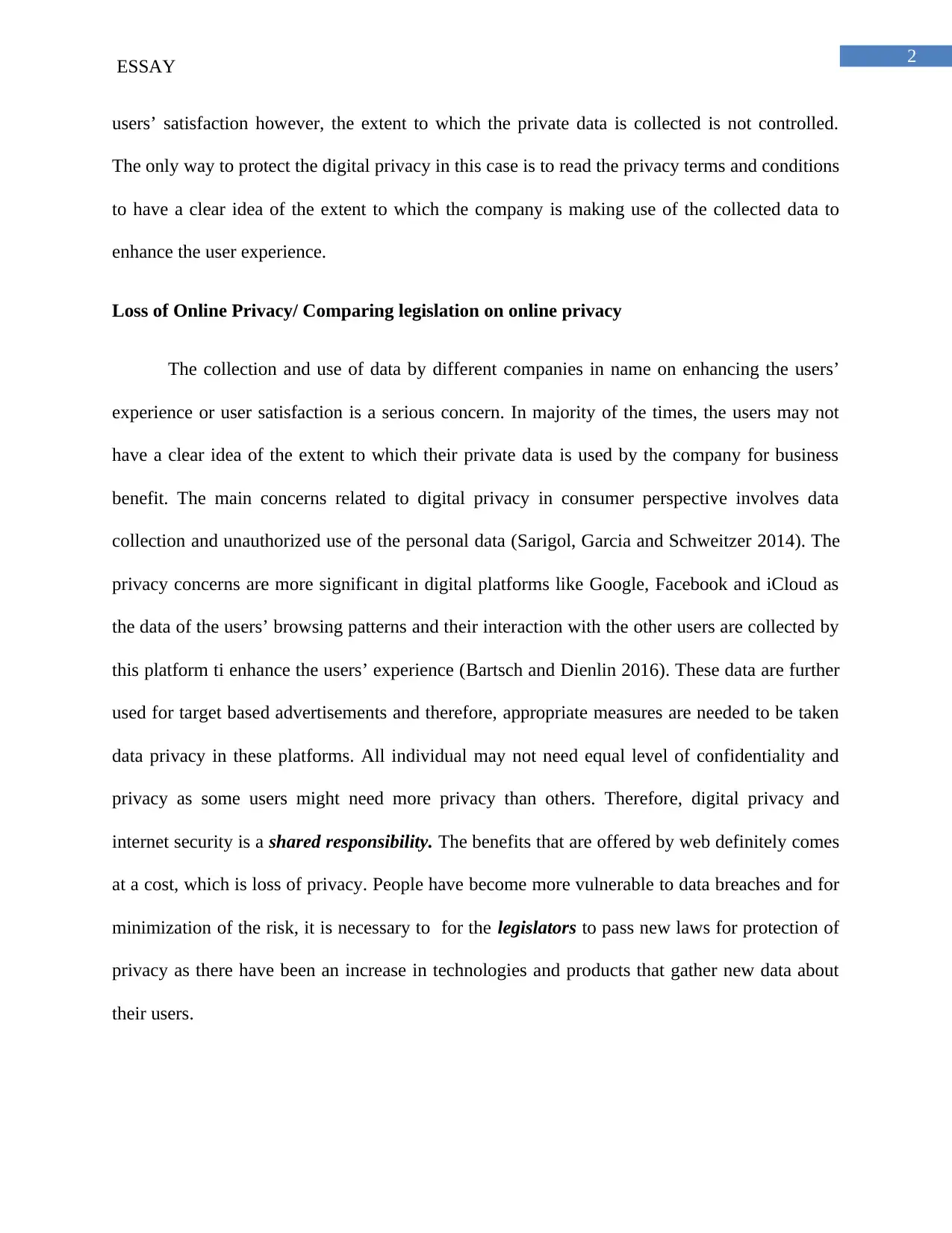
2
ESSAY
users’ satisfaction however, the extent to which the private data is collected is not controlled.
The only way to protect the digital privacy in this case is to read the privacy terms and conditions
to have a clear idea of the extent to which the company is making use of the collected data to
enhance the user experience.
Loss of Online Privacy/ Comparing legislation on online privacy
The collection and use of data by different companies in name on enhancing the users’
experience or user satisfaction is a serious concern. In majority of the times, the users may not
have a clear idea of the extent to which their private data is used by the company for business
benefit. The main concerns related to digital privacy in consumer perspective involves data
collection and unauthorized use of the personal data (Sarigol, Garcia and Schweitzer 2014). The
privacy concerns are more significant in digital platforms like Google, Facebook and iCloud as
the data of the users’ browsing patterns and their interaction with the other users are collected by
this platform ti enhance the users’ experience (Bartsch and Dienlin 2016). These data are further
used for target based advertisements and therefore, appropriate measures are needed to be taken
data privacy in these platforms. All individual may not need equal level of confidentiality and
privacy as some users might need more privacy than others. Therefore, digital privacy and
internet security is a shared responsibility. The benefits that are offered by web definitely comes
at a cost, which is loss of privacy. People have become more vulnerable to data breaches and for
minimization of the risk, it is necessary to for the legislators to pass new laws for protection of
privacy as there have been an increase in technologies and products that gather new data about
their users.
ESSAY
users’ satisfaction however, the extent to which the private data is collected is not controlled.
The only way to protect the digital privacy in this case is to read the privacy terms and conditions
to have a clear idea of the extent to which the company is making use of the collected data to
enhance the user experience.
Loss of Online Privacy/ Comparing legislation on online privacy
The collection and use of data by different companies in name on enhancing the users’
experience or user satisfaction is a serious concern. In majority of the times, the users may not
have a clear idea of the extent to which their private data is used by the company for business
benefit. The main concerns related to digital privacy in consumer perspective involves data
collection and unauthorized use of the personal data (Sarigol, Garcia and Schweitzer 2014). The
privacy concerns are more significant in digital platforms like Google, Facebook and iCloud as
the data of the users’ browsing patterns and their interaction with the other users are collected by
this platform ti enhance the users’ experience (Bartsch and Dienlin 2016). These data are further
used for target based advertisements and therefore, appropriate measures are needed to be taken
data privacy in these platforms. All individual may not need equal level of confidentiality and
privacy as some users might need more privacy than others. Therefore, digital privacy and
internet security is a shared responsibility. The benefits that are offered by web definitely comes
at a cost, which is loss of privacy. People have become more vulnerable to data breaches and for
minimization of the risk, it is necessary to for the legislators to pass new laws for protection of
privacy as there have been an increase in technologies and products that gather new data about
their users.
⊘ This is a preview!⊘
Do you want full access?
Subscribe today to unlock all pages.

Trusted by 1+ million students worldwide
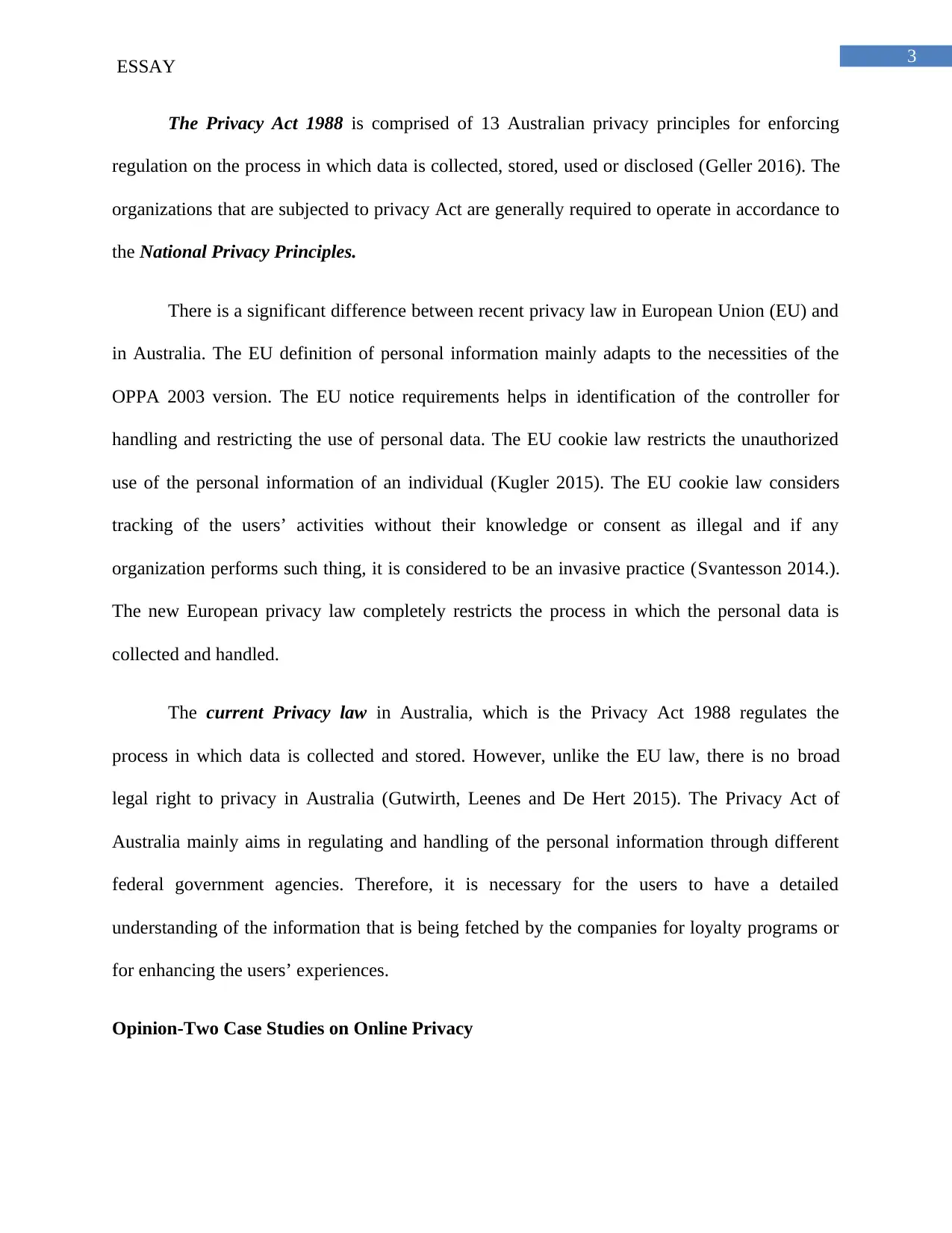
3
ESSAY
The Privacy Act 1988 is comprised of 13 Australian privacy principles for enforcing
regulation on the process in which data is collected, stored, used or disclosed (Geller 2016). The
organizations that are subjected to privacy Act are generally required to operate in accordance to
the National Privacy Principles.
There is a significant difference between recent privacy law in European Union (EU) and
in Australia. The EU definition of personal information mainly adapts to the necessities of the
OPPA 2003 version. The EU notice requirements helps in identification of the controller for
handling and restricting the use of personal data. The EU cookie law restricts the unauthorized
use of the personal information of an individual (Kugler 2015). The EU cookie law considers
tracking of the users’ activities without their knowledge or consent as illegal and if any
organization performs such thing, it is considered to be an invasive practice (Svantesson 2014.).
The new European privacy law completely restricts the process in which the personal data is
collected and handled.
The current Privacy law in Australia, which is the Privacy Act 1988 regulates the
process in which data is collected and stored. However, unlike the EU law, there is no broad
legal right to privacy in Australia (Gutwirth, Leenes and De Hert 2015). The Privacy Act of
Australia mainly aims in regulating and handling of the personal information through different
federal government agencies. Therefore, it is necessary for the users to have a detailed
understanding of the information that is being fetched by the companies for loyalty programs or
for enhancing the users’ experiences.
Opinion-Two Case Studies on Online Privacy
ESSAY
The Privacy Act 1988 is comprised of 13 Australian privacy principles for enforcing
regulation on the process in which data is collected, stored, used or disclosed (Geller 2016). The
organizations that are subjected to privacy Act are generally required to operate in accordance to
the National Privacy Principles.
There is a significant difference between recent privacy law in European Union (EU) and
in Australia. The EU definition of personal information mainly adapts to the necessities of the
OPPA 2003 version. The EU notice requirements helps in identification of the controller for
handling and restricting the use of personal data. The EU cookie law restricts the unauthorized
use of the personal information of an individual (Kugler 2015). The EU cookie law considers
tracking of the users’ activities without their knowledge or consent as illegal and if any
organization performs such thing, it is considered to be an invasive practice (Svantesson 2014.).
The new European privacy law completely restricts the process in which the personal data is
collected and handled.
The current Privacy law in Australia, which is the Privacy Act 1988 regulates the
process in which data is collected and stored. However, unlike the EU law, there is no broad
legal right to privacy in Australia (Gutwirth, Leenes and De Hert 2015). The Privacy Act of
Australia mainly aims in regulating and handling of the personal information through different
federal government agencies. Therefore, it is necessary for the users to have a detailed
understanding of the information that is being fetched by the companies for loyalty programs or
for enhancing the users’ experiences.
Opinion-Two Case Studies on Online Privacy
Paraphrase This Document
Need a fresh take? Get an instant paraphrase of this document with our AI Paraphraser
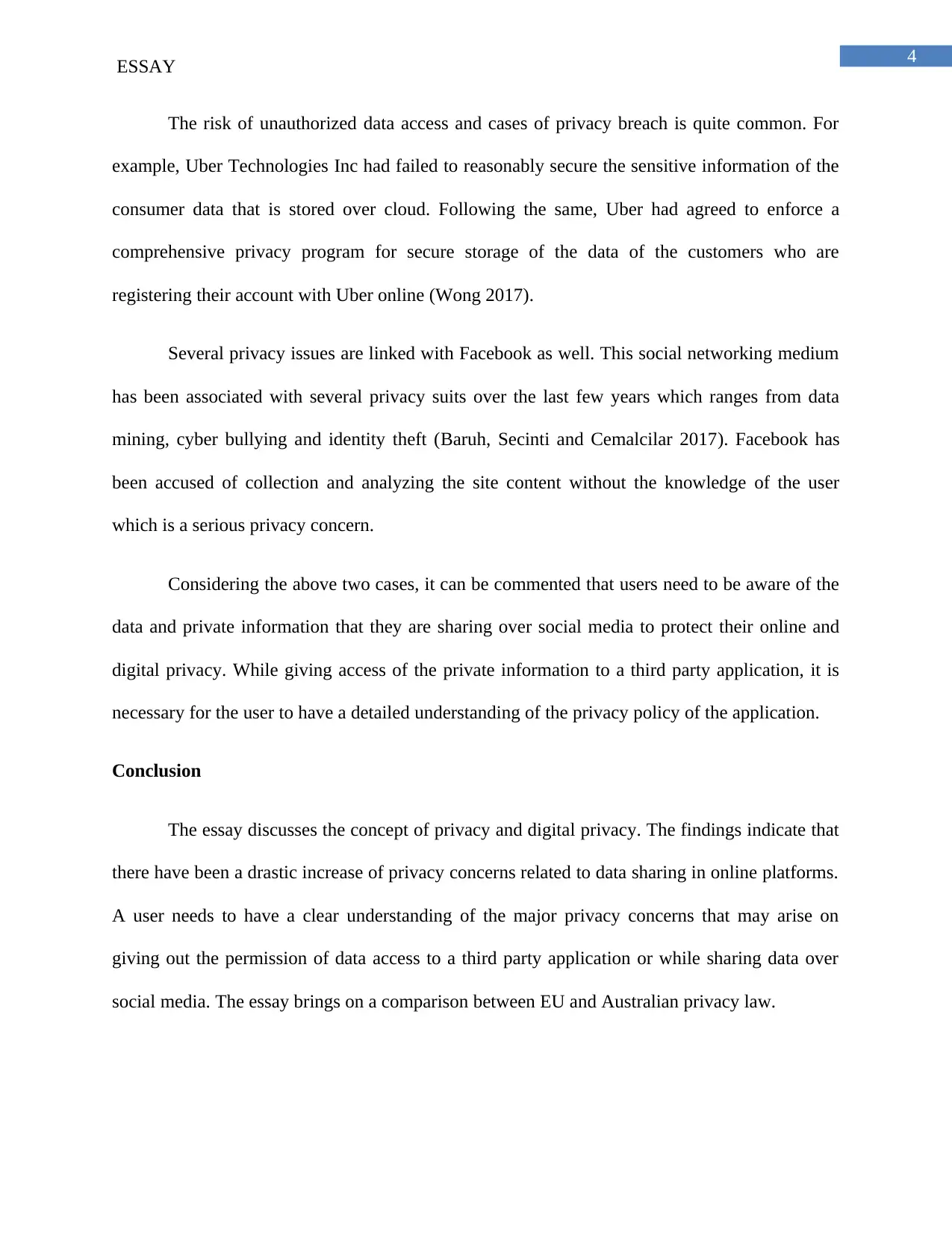
4
ESSAY
The risk of unauthorized data access and cases of privacy breach is quite common. For
example, Uber Technologies Inc had failed to reasonably secure the sensitive information of the
consumer data that is stored over cloud. Following the same, Uber had agreed to enforce a
comprehensive privacy program for secure storage of the data of the customers who are
registering their account with Uber online (Wong 2017).
Several privacy issues are linked with Facebook as well. This social networking medium
has been associated with several privacy suits over the last few years which ranges from data
mining, cyber bullying and identity theft (Baruh, Secinti and Cemalcilar 2017). Facebook has
been accused of collection and analyzing the site content without the knowledge of the user
which is a serious privacy concern.
Considering the above two cases, it can be commented that users need to be aware of the
data and private information that they are sharing over social media to protect their online and
digital privacy. While giving access of the private information to a third party application, it is
necessary for the user to have a detailed understanding of the privacy policy of the application.
Conclusion
The essay discusses the concept of privacy and digital privacy. The findings indicate that
there have been a drastic increase of privacy concerns related to data sharing in online platforms.
A user needs to have a clear understanding of the major privacy concerns that may arise on
giving out the permission of data access to a third party application or while sharing data over
social media. The essay brings on a comparison between EU and Australian privacy law.
ESSAY
The risk of unauthorized data access and cases of privacy breach is quite common. For
example, Uber Technologies Inc had failed to reasonably secure the sensitive information of the
consumer data that is stored over cloud. Following the same, Uber had agreed to enforce a
comprehensive privacy program for secure storage of the data of the customers who are
registering their account with Uber online (Wong 2017).
Several privacy issues are linked with Facebook as well. This social networking medium
has been associated with several privacy suits over the last few years which ranges from data
mining, cyber bullying and identity theft (Baruh, Secinti and Cemalcilar 2017). Facebook has
been accused of collection and analyzing the site content without the knowledge of the user
which is a serious privacy concern.
Considering the above two cases, it can be commented that users need to be aware of the
data and private information that they are sharing over social media to protect their online and
digital privacy. While giving access of the private information to a third party application, it is
necessary for the user to have a detailed understanding of the privacy policy of the application.
Conclusion
The essay discusses the concept of privacy and digital privacy. The findings indicate that
there have been a drastic increase of privacy concerns related to data sharing in online platforms.
A user needs to have a clear understanding of the major privacy concerns that may arise on
giving out the permission of data access to a third party application or while sharing data over
social media. The essay brings on a comparison between EU and Australian privacy law.
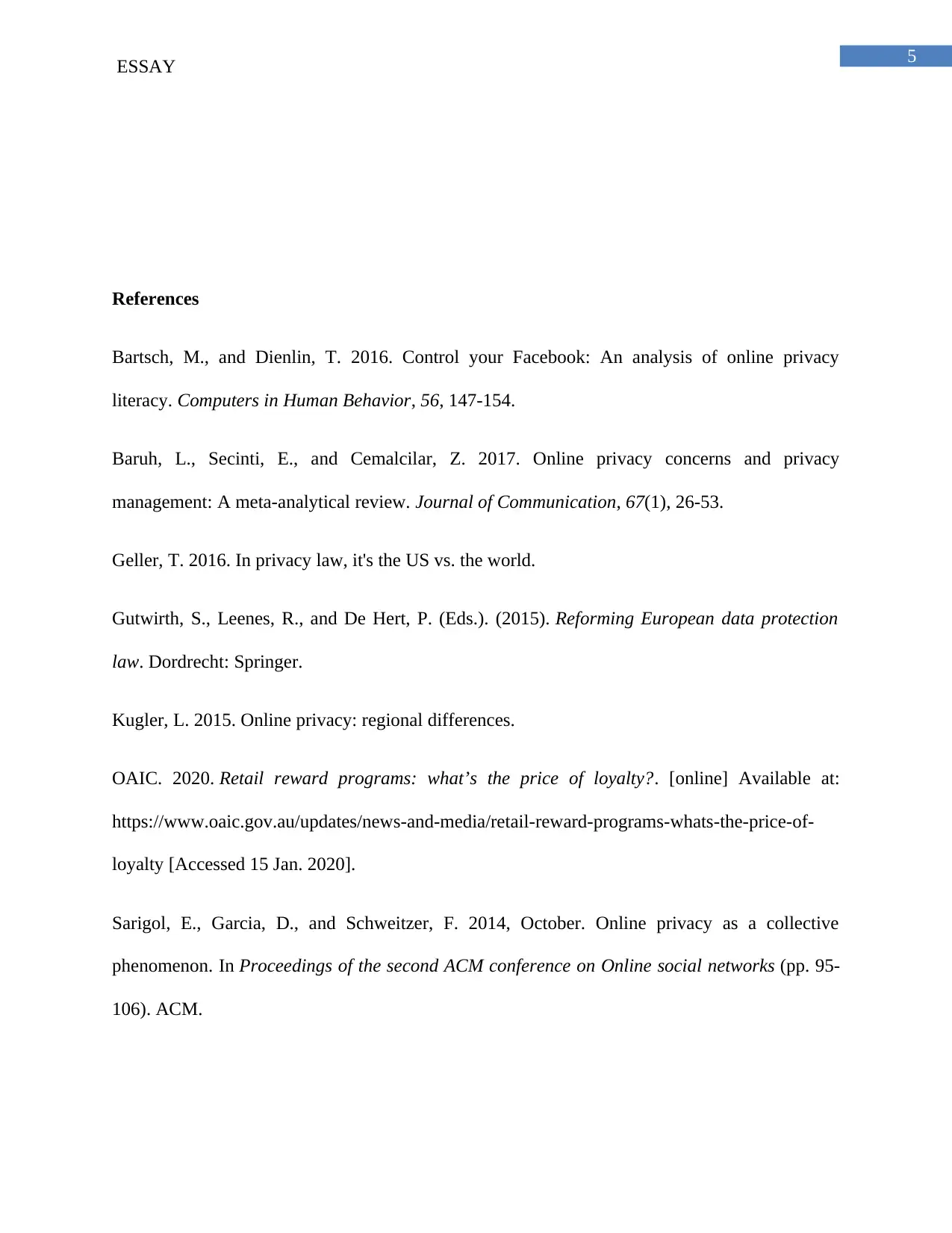
5
ESSAY
References
Bartsch, M., and Dienlin, T. 2016. Control your Facebook: An analysis of online privacy
literacy. Computers in Human Behavior, 56, 147-154.
Baruh, L., Secinti, E., and Cemalcilar, Z. 2017. Online privacy concerns and privacy
management: A meta-analytical review. Journal of Communication, 67(1), 26-53.
Geller, T. 2016. In privacy law, it's the US vs. the world.
Gutwirth, S., Leenes, R., and De Hert, P. (Eds.). (2015). Reforming European data protection
law. Dordrecht: Springer.
Kugler, L. 2015. Online privacy: regional differences.
OAIC. 2020. Retail reward programs: what’s the price of loyalty?. [online] Available at:
https://www.oaic.gov.au/updates/news-and-media/retail-reward-programs-whats-the-price-of-
loyalty [Accessed 15 Jan. 2020].
Sarigol, E., Garcia, D., and Schweitzer, F. 2014, October. Online privacy as a collective
phenomenon. In Proceedings of the second ACM conference on Online social networks (pp. 95-
106). ACM.
ESSAY
References
Bartsch, M., and Dienlin, T. 2016. Control your Facebook: An analysis of online privacy
literacy. Computers in Human Behavior, 56, 147-154.
Baruh, L., Secinti, E., and Cemalcilar, Z. 2017. Online privacy concerns and privacy
management: A meta-analytical review. Journal of Communication, 67(1), 26-53.
Geller, T. 2016. In privacy law, it's the US vs. the world.
Gutwirth, S., Leenes, R., and De Hert, P. (Eds.). (2015). Reforming European data protection
law. Dordrecht: Springer.
Kugler, L. 2015. Online privacy: regional differences.
OAIC. 2020. Retail reward programs: what’s the price of loyalty?. [online] Available at:
https://www.oaic.gov.au/updates/news-and-media/retail-reward-programs-whats-the-price-of-
loyalty [Accessed 15 Jan. 2020].
Sarigol, E., Garcia, D., and Schweitzer, F. 2014, October. Online privacy as a collective
phenomenon. In Proceedings of the second ACM conference on Online social networks (pp. 95-
106). ACM.
⊘ This is a preview!⊘
Do you want full access?
Subscribe today to unlock all pages.

Trusted by 1+ million students worldwide
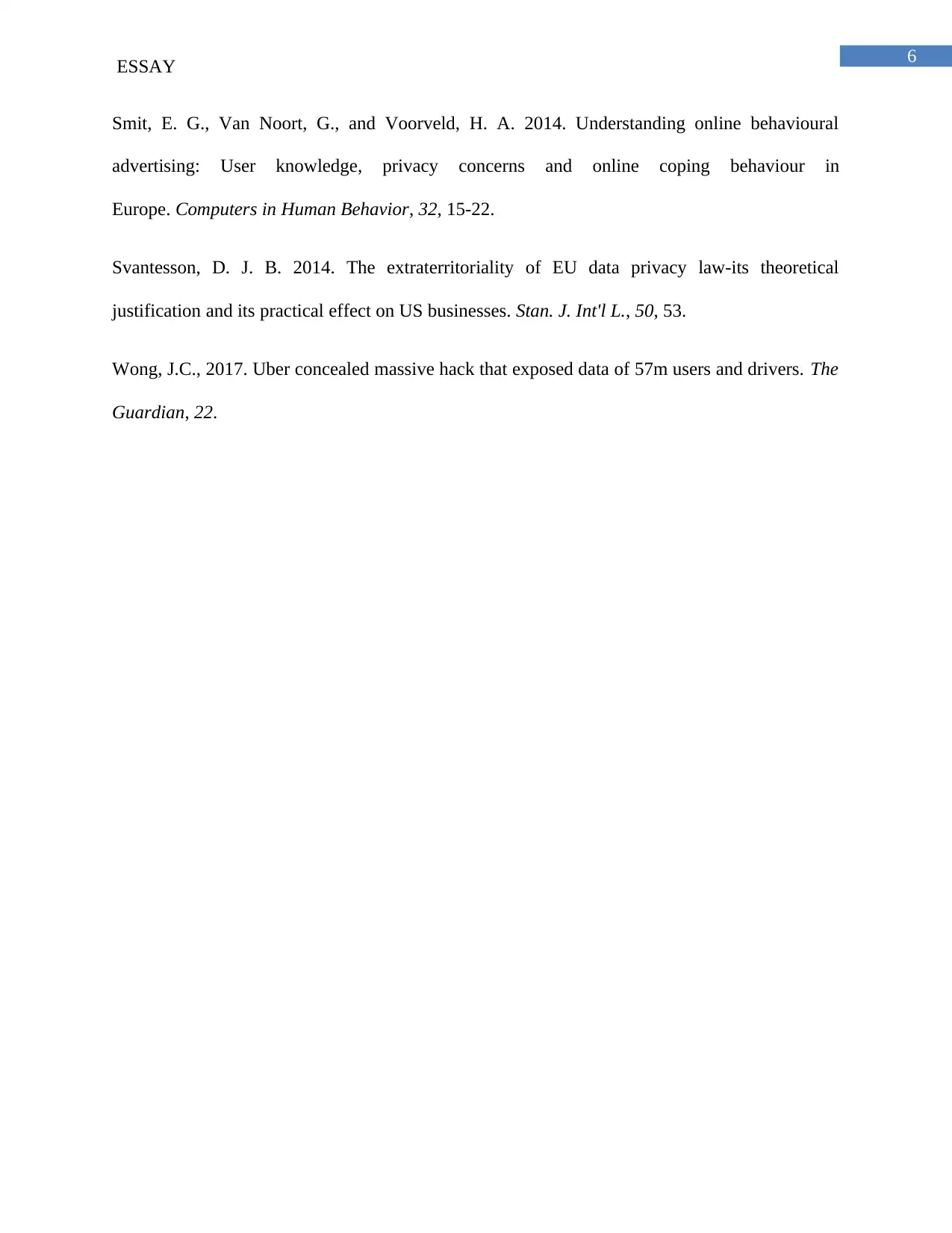
6
ESSAY
Smit, E. G., Van Noort, G., and Voorveld, H. A. 2014. Understanding online behavioural
advertising: User knowledge, privacy concerns and online coping behaviour in
Europe. Computers in Human Behavior, 32, 15-22.
Svantesson, D. J. B. 2014. The extraterritoriality of EU data privacy law-its theoretical
justification and its practical effect on US businesses. Stan. J. Int'l L., 50, 53.
Wong, J.C., 2017. Uber concealed massive hack that exposed data of 57m users and drivers. The
Guardian, 22.
ESSAY
Smit, E. G., Van Noort, G., and Voorveld, H. A. 2014. Understanding online behavioural
advertising: User knowledge, privacy concerns and online coping behaviour in
Europe. Computers in Human Behavior, 32, 15-22.
Svantesson, D. J. B. 2014. The extraterritoriality of EU data privacy law-its theoretical
justification and its practical effect on US businesses. Stan. J. Int'l L., 50, 53.
Wong, J.C., 2017. Uber concealed massive hack that exposed data of 57m users and drivers. The
Guardian, 22.
1 out of 7
Related Documents
Your All-in-One AI-Powered Toolkit for Academic Success.
+13062052269
info@desklib.com
Available 24*7 on WhatsApp / Email
![[object Object]](/_next/static/media/star-bottom.7253800d.svg)
Unlock your academic potential
Copyright © 2020–2026 A2Z Services. All Rights Reserved. Developed and managed by ZUCOL.

![NIT2201 - Online Privacy: An Analytical Essay - [University Name]](/_next/image/?url=https%3A%2F%2Fdesklib.com%2Fmedia%2Fimages%2Fgc%2F0656cbdd520f46bb97c676d8d876831a.jpg&w=256&q=75)



